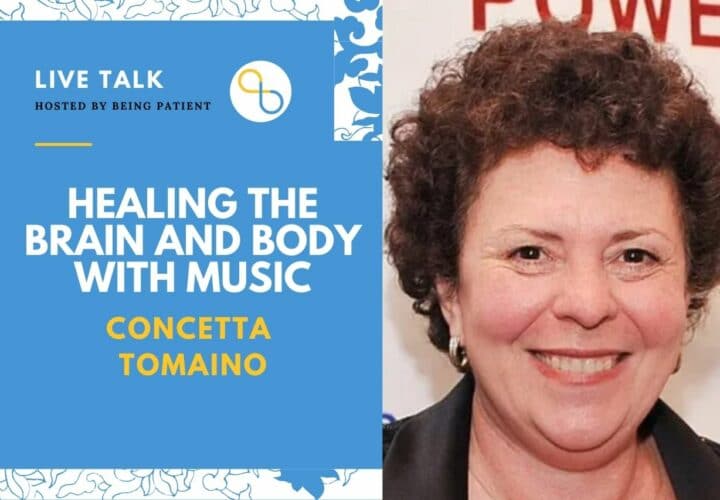Licensed music therapists can help ease dementia's symptoms. Here are a few ways to bring the benefits of music therapy to everyday dementia care.
Music touches our lives in profound ways. Songs that remind us of meaningful life moments, big or small, can evoke deeply-rooted emotions and memories. These connections we form with music are remarkably resilient — so much so that they remain ingrained in the brain even as neurodegenerative diseases like Alzheimer’s take hold. This is the basis of music therapy for dementia.
Studies show that music therapy can help improve the quality of life for people living with Alzheimer’s and other dementias. Familiar music can offer relief from neuropsychiatric symptoms, while stimulating emotions, old memories, cognition and even physical movement.
Concetta Tomaino, a pioneer in the field of music therapy and the executive director and co-founder of the Institute for Music and Neurologic Function (IMNF), believes sharing musical experiences with loved ones can help people maintain strong relationships for as long as possible.
“People should really look to see if music therapy is available to them and in their city, and to take advantage of bringing music into their life,” Tomaino said in a Being Patient LiveTalk. “I’m hoping that it is a part of everybody’s life.”
Undergoing music therapy, participating in special music programs like choirs, or simply enjoying music with friends and family are all ways of leveraging its benefits to the brain health and to mental health. Here are a few things Tomaino shared that can help bring the benefits of music to people living with Alzheimer’s and dementia.
1. Incorporate music into everyday dementia caregiving
Tomaino advises caregivers and people under their care to spend time together each day listening to music that they enjoy, and perhaps adding some movement to the experience.
“Maybe sing some of the songs. If you like to dance, put on some music. Being mobile actually helps with balance and coordination,” she said. “If there’s an upbeat song that you can play to do some exercise and movement, that’s really great.”
When it comes to creating a personalized music playlist, the nonprofit organization Music & Memory, where Tomaino is a board member, recommends discussing music preferences with loved ones, exploring their favorite songs from childhood, and sampling some music to get a sense of their reaction. The organization suggests focusing on picking artists’ best songs, and switching up a playlist’s music every now and then.
As families adapt to the changes that accompany dementia, music can also bridge the generation gap, bringing the young and the old together. For Jessica Farthing, shared musical experiences among family members harken back sweet memories of times spent with her mother, who was diagnosed with dementia.
“In our family, music was always important,” Farthing wrote for Being Patient. “Several of the teens were musicians, so using their own interest to spend time with their grandmother was a perfect way to let them feel like they added value to her day. This ranged from an old record from her collection to my son’s rendition of ‘Little Wing’ on the guitar. It also resulted in several opportunities to dance, which brought a big smile on my mother’s face.”
Tomaino also suggested seeking group-based music programs, like choirs and percussion programs tailored for people living with dementia.
2. Work with a professional, licensed music therapist for dementia
Depending on each person’s needs, studies show that music therapy can serve as an intervention for behavioral and psychological issues, as well as deficits in movement and cognitive functions. Beyond bringing music into daily caregiving, people can pursue music therapy from a professional music therapist.
Ultimately, a credentialed music therapist part of a broader team of healthcare professionals, working together to support a person’s overall treatment.
Following a diagnosis, maintaining avenues of self-expression and self-validation for as long as possible is critical, Tomaino explained, and music can serve that purpose. A diagnosis of Alzheimer’s or another dementia upturns people’s lives, calling into question their autonomy and sense of personhood, but, she said music therapy allows a person to be creative and expressive, validating their identity and their own abilities.
With music’s dynamic effects on the brain, music therapy techniques hold the potential to strengthen short-term memory and executive functions. For instance, a music therapist may offer rhythmic patterns for a patient to follow along with the percussion, building on their focus and attention, Tomaino noted.
She added that music can be used as a mnemonic tool to help with memorizing and recalling information, such as phone numbers and addresses. Other creative strategies include making music through improvisation and songwriting.
By partnering with caregivers, family, or care facilities’ staff, a music therapist can also help curate personalized music playlists, ensuring that the song choices are best fit for a person.
“Because music is so personal to us, and because it holds so many deep memories, there could be music that makes us feel wonderful, but there’s also music that can make us feel very sad,” Tomaino said. “One of the things that music therapists are trained to do is even if the music makes the person feel sad, [music therapists] allow them to express those feelings in a way that’s meaningful. But to a caregiver that maybe doesn’t understand what’s going on, we usually suggest [avoiding] songs that may be too difficult for the person to listen to emotionally.”
3. Check out these resources and programs for using music in dementia care
The Certification Board for Music Therapists and the American Music Therapy Association are good places to start when exploring options for a credentialed music therapist.
For accessible resources to bring the benefits of music home, Music & Memory has a handy guide for creating a personalized music playlist. Further, they offer information for families and care facilities on the science behind the therapeutic effects of personalized music, and on putting that science to work.
IMNF also provides resources on its research and educational initiatives on music, as well as information on its music therapy services.





My Husband, as a former professional Ballroom Dancer and performer/Teacher cannot dance any more due to the balance problem with Alzheimer’s— but he can recognize the music and what type of dance it represents.